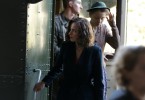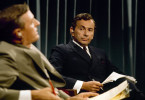BoJack Horseman
Season 2
(Netflix)
B
The pun-ridden trials of an anamorphic, Hollywood has-been feels like a bit of a mess, especially when you say it out loud. Series like ABC’s Dinosaurs and NBC’s Father of the Pride were humorous but ultimately short-lived, as they failed to thread any substantial tether for an American audience to latch onto. Even modern hits like South Park and Family Guy, while at times harrowing, aren’t lauded for much more than their nostalgic or pop culture-infused gags. Enter Raphael Bob-Waksberg’s BoJack Horseman, an animated sitcom exclusive to Netflix that, despite a rocky first season, has emerged as one of the most telling and sincere pieces to emerge from the sub-genre. Though far from perfect — especially when considered against comedic titans like Louie — the admirable attempts at striking a sincere chord in the series’ first outing lend themselves to a much more sincere melody this time around.
After the murky conclusion of last season, BoJack Horseman (voiced by Will Arnett) is granted his dream role as a Secretariat, a famous race horse who ultimately committed suicide at the Kennedy Bridge. While BoJack is initially enthralled with the prospect of fulfilling the role, there are unresolved conflicts and a series of clashes with Secretariat’s director, Kelsey Jannings (Maria Bamford). 90’s star Mr. Peanutbutter (Paul F. Tompkins) and BoJack’s resident couch potato, Todd (Aaron Paul), resume their joint endeavors, starting with a bastardized and dangerous version of Disneyland. Meanwhile, BoJack’s former ghost writer, Diane (Alison Brie), ponders traveling to a war-torn country to both fulfill her investigative itch and place some distance between herself and her aforementioned husband, Mr. Peanutbutter.
The star-ridden and capable ensemble propels BoJack to a point of accessibility, especially with the likes of Amy Sedaris and series newcomer Lisa Kudrow. Much of the cast verbally bounces off of one another with a synergy comparable to It’s Always Sunny, despite the cartoonish vehicle they’re bound by. While Arnett doesn’t hinder the narrative in any way, cast members in the periphery have the most meaningful exchanges (such as between Brie and Tompkins). Unfortunately, Sedaris’ Princess Carolyn, while still compelling, seems to be sidelined for a large portion of this season in favor of Kudrow’s Wanda. Still, the latter holds her own adequately, and thus the tradeoff seems a bit less noticeable.
While a slew of familiar voices teases us into comfort, Bob-Waksberg tightens the deal with a clever, socially relevant wit paired with a dissection of the star-studded struggle for self-validation. Though the allusions to Prairie Home Companion and Serial left me (perhaps superficially) reeling, some of the grammatical interplay didn’t hold up as well as it did in the first season. These new installments find power in the bizarre social implications this world of anthropomorphic caricatures tends to put forth, most notably in “Chickens.”
Of course, BoJack doesn’t go very far as just a comedy; the final episodes of the last season were the ones that truly resonated. Appropriately, Bob-Waksberg’s writing staff seems to have taken note, as moments from BoJack’s troubling upbringing are interwoven with his contemporary crises, reaching an incredibly troubling crescendo with “Escape from L.A.” It’s these discussions of love, intentional ignorance and worth that every now and again encourage us to forget we’re watching a humanoid horse argue with a similarly dispositioned deer. It’s all not unlike a fluffy version Sofia Coppola’s Somewhere or — dare I draw the comparison — Lost in Translation. And when we do frequently approach that realization, it’s rarely with disappointment, but awe. Perhaps, in an odd way, BoJack has carefully bounded over the psychological wall that frequently prevents us from empathizing with the plight of animated characters.
Again, BoJack Horseman is far from perfect. Despite this powerful return to form, an almost sure-fire renewal could lead to a quick downturn (a la The Boondocks). Still, we can revel while we still have the chance; as of now, BoJack Horseman is on the verge of being one of the most culturally relevant cartoons to emerge in the last decade.





